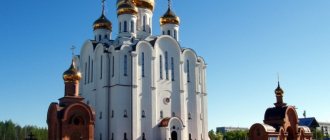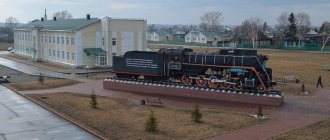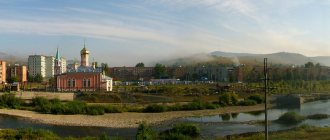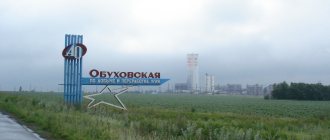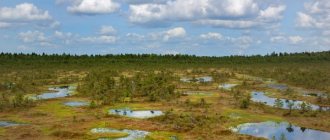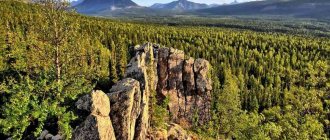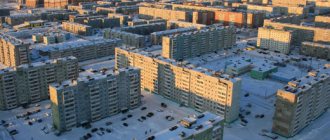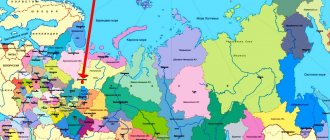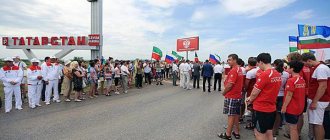Emva
(Komi Republic)
OKATO code:
87208501
Founded: Urban settlement since:
1941
City since:
1985 City of district subordination (Knyazhpogostsky district of the Komi Republic)
Center:
Knyazhpogostsky district
The city was formerly called:
| Railway | 1941 | 1985 |
| Telephone code (reference phone) | |
| 82139***** | 9-10-88 |
Deviation from Moscow time, hours:
0
Geographic latitude:
62°35′
Geographic longitude:
50°53′
Altitude above sea level, meters:
100 Sunrise and sunset times in the city of Yemva
Emva - what does this name mean?
Sometimes if you think about the etymology of a word, you can have a lot of fun. Very often, many people use words without thinking at all about their origin, and then suddenly it dawns on them, and the reaction comes to shock. So it is with Emva.
Yemva has several meanings, but the main one is the river (Vym). A strange name for a river, isn't it? The local population believes that the word itself is made up of two terms: “Em” - needle and “You” - water. How to explain their relationship? Apparently, the Emva River was once so crystal clear that even a needle could be seen at its bottom with the naked eye. However, at the same time, no matter how poetic this explanation of the name may be, there are some inconsistencies in it. And the point is not even that now the river absolutely does not meet the characteristics laid down in its name due to the rafting work being carried out on it. From the very beginning, it could not have been so crystal clear due to the presence of sand deposits in it, which are washed away by any movement of water.
The opinions of those knowledgeable on this issue differ. According to the scientist Plesovsky, Yemva comes from the word in the Komi language Vom - mouth, mouth. This is where the name Vym came from. The famous scientist Turkin claims that Yemva carries a Khanty root, which means “sacred”. This etymology makes sense due to the fact that most peoples worshiped rivers as gods. Back in the twentieth century, the Komi people treated the Emva River with special respect. Moreover, during religious holidays, the Komi people preferred to prepare tea from the water of Yemva rather than from wells, paying tribute to the river and admiring its sacredness.
Finally, many attribute Mansi roots to the word Yemva. It was believed that the inhabitants of the Trans-Ural region were distinguished by certain connections, according to which the characteristics of the object were often included in the names. According to this concept, Em means sand and Wa means river. It turns out that Yemva is a river consisting of sandy deposits. Indeed, the Emva River is replete with sands located along the entire bottom. This version is similar to the truth, but it is not the last.
If you examine the history of the Komi land from the very beginning, then even before their origin the region was the home of the Vepsian tribes, called Yem. It is believed that the Yem tribes were nomads, and if you carefully analyze their movements on the map, many of the rivers through which they crossed have the root “Em” in their names. That is why there is a theory that the name of the Yemva River was founded in ancient times by the Vepsian tribes.
Nevertheless, having many theories in their arsenal, experts have not come to a final decision about what still serves as the etymology of the word Yemva.
Map
| Yemva: maps |
Yemva: photo from space (Google Maps) Yemva: photo from space (Microsoft Virtual Earth)
| Yemva. Nearest cities. Distances in km. on the map (in brackets along roads) + direction. Using the hyperlink in the distance , you can get the route (information courtesy of the AutoTransInfo website) | |||
| 1 | Mikun | 50 (97) | SW |
| 2 | Aikino | 61 (85) | SW |
| 3 | Zheshart | 86 (119) | SW |
| 4 | Kortkeros | 94 (167) | YU |
| 5 | Krasnozatonsky | 102 () | YU |
| 6 | Syktyvkar | 103 (120) | YU |
| 7 | Yarensk (Arkhangelsk region) | 103 (152) | SW |
| 8 | Vylgort | 109 (130) | YU |
| 9 | Koslan | 138 () | NW |
| 10 | Usogorsk | 143 (255) | NW |
| 11 | Water | 162 () | NE |
| 12 | Yarega | 164 () | NE |
| 13 | Vizinga | 173 (205) | YU |
| 14 | Ust-Kulom | 177 (304) | SE |
a brief description of
The city is located on the river. Vym, 130 km northeast of Syktyvkar. Railway station Knyazh-Pogost.
Territory (sq. km): 61
Information about the city of Yemva on the Russian Wikipedia site
Historical sketch
It arose as a village at the Knyazhpogost station (opened in 1942), named after the neighboring village of Knyazhpogost. Workers' settlement Zheleznodorozhny since 1941
In 1985, the village was transformed into a city and renamed Yemva. The name was given according to the location of the city on the river. The vym, which the local population calls Yemva: the hydronyms are different phonetic forms of a single name from the Khanty emeng “holy, sacred” and Komi va “river”.
Economy
Enterprises of the logging and woodworking industries. Mechanical plant.
Main enterprises
WOOD PROCESSING INDUSTRY
LLC "Knyazhpogostsky fiberboard plant"
243200, Komi Republic, Knyazhpogostsky district, Yemva, st.
Vymskaya, 35 Offers:
Fiberboard
Museums, galleries, exhibition halls
Knyazhpogostsky District Museum of History and Local Lore 169200, Komi Republic, Knyazhpogostsky district, Emva, st. Dzerzhinskogo, 74 Phone(s): (2139) 9-2131
| Population by year (thousands of inhabitants) | |||||||
| 1959 | 13.7 | 2000 | 16.6 | 2010 | 14.3 | 2017 | 12.9 |
| 1970 | 13.5 | 2001 | 16.4 | 2011 | 14.6 | 2018 | 12.6 |
| 1979 | 15.9 | 2003 | 16.7 | 2012 | 14.1 | 2019 | 12.5 |
| 1989 | 18.8 | 2005 | 15.8 | 2013 | 13.9 | 2020 | 12.4 |
| 1992 | 18.7 | 2006 | 15.3 | 2014 | 13.6 | 2021 | 12.4 |
| 1996 | 17.9 | 2007 | 15.1 | 2015 | 13.4 | ||
| 1998 | 17.2 | 2008 | 14.8 | 2016 | 13.2 | ||
Geographical position
Yemva is located on the right bank of the river. Vym , in the northeast of the Komi . The city unites suburbs and microdistricts - Central, Achim, Severny, Novy, 20th and 21st microdistricts, which received their names from the numbering of the Gulag camps. Area 61 sq. km. Population – 13,625 people. (as of 2014). National composition: Russians, Komi, Ukrainians, Tatars.
The city of Yemva is the administrative center of the Knyazhpogostsky district (62°35 N 50°51 E).
Climate
The region in which the city of Yemva is characterized by a predominance of a temperate continental climate, with short but rather warm summers and long, harsh winters. Average temperatures in winter are -17...-19 degrees C, in summer +18...+20 degrees C. Frosts are possible in July. The average annual precipitation is 550 mm.
Natural attractions
Lake Sindorskoye , the second largest among the entire chain of lakes in the Komi , is located near the city of Yemva , and is not only a unique natural monument, but also a rather interesting object from the point of view of tourism and recreation. A special feature of the lake is its unique moving islands. The bottom of the lake is lined with healing organic silt - sapropel, and its water area surprises with the diversity of the aquatic world.
Story
The city is named after the local river. Vym – Yemva , which means “sacred water”. In the 1930s, this settlement was called Zheleznodorozhny and had the status of an urban-type settlement. Yemva city status since 1985. More recently Yemva was one of the islands of the Gulag archipelago, and the prisoners who were there built the Syktyvkar-Knyazhpogost highway and the railway.
In modern Yemva, ethno-eco-agritourism is actively developing. At the Vorvozh farm, tourists can not only get acquainted with the peculiarities of running a Komi household, but also learn the local culinary art. Horseback riding and dog riding are also organized. St. Bernards, Central Asian Shepherds and Dachshunds are bred in the dog kennel. It is definitely worth visiting the museum located on the territory of the city , dedicated to the theme of the Gulag , which is recognized as one of the best museums in the Komi - the Museum of the History of Repressions . Also attractive for tourists is the Museum of History and Local Lore of the Knyazhopogost district , which presents many exhibitions dedicated to the topics of political repression, models of sea vessels, as well as a golden gallery of fellow countrymen.
Famous people
Among the famous people who glorified Yemva are scientists P. Sorokin and V. Senyukov , merchant Mikit Pash (P. N. Kozlov), writer I. , poet F. Shcherbakov , sculptor Yu. Borisov , artist V. Polyakov , the first Komi artist Sukhareva A. , actress Mikova G. , teacher Lyuoseva G. , local historian Shlopova O.
How to get there
get to Yemva along the Syktyvkar - Sosnogorsk highway by bus or car. The Kotlas – Vorkuta railway (Knyazh-Pogost station) and the Syktyvkar – Sosnogorsk highway pass through the city of Yemva In the village Knyazhpogost can only be reached on the opposite bank of the river by boat. There is no road there.
The nearest airport is in the city of Yemva .
Excerpt characterizing Yemva
Hearing this indifferent voice, Rostov was afraid of what he was doing; the thought of meeting the sovereign at any moment was so tempting and therefore so terrible for him that he was ready to flee, but the chamberlain Fourier, who met him, opened the door to the duty room for him and Rostov entered. A short, plump man of about 30, in white trousers, over the knee boots and one cambric shirt, apparently just put on, stood in this room; the valet was fastening a beautiful new silk-embroidered belt on his back, which for some reason Rostov noticed. This man was talking to someone who was in another room. “Bien faite et la beaute du diable, [Well-built and the beauty of youth," this man said, and when he saw Rostov he stopped talking and frowned. -What do you want? Request?... – Qu'est ce que c'est? [What is this?] - someone asked from another room. “Encore un petitionnaire, [Another petitioner,”] answered the man with the help. - Tell him what's next. It's coming out now, we have to go. - After the day after tomorrow. It’s too late... Rostov turned and wanted to leave, but the man in the arms stopped him. - From whom? Who are you? “From Major Denisov,” Rostov answered. - Who are you? Officer? - Lieutenant, Count Rostov. - What courage! Give it on command. And go, go... - And he began to put on the uniform handed to him by the valet. Rostov went out again into the hallway and noticed that there were already many officers and generals on the porch in full dress uniform, whom he had to pass by. Cursing his courage, frozen by the thought that at any moment he could meet the sovereign and in his presence be disgraced and sent under arrest, fully understanding the indecency of his act and repenting of it, Rostov, with downcast eyes, made his way out of the house, surrounded by a crowd of brilliant retinue , when someone's familiar voice called out to him and someone's hand stopped him. - What are you doing here, father, in a tailcoat? – his bass voice asked. This was a cavalry general who earned the special favor of the sovereign during this campaign, the former head of the division in which Rostov served. Rostov fearfully began to make excuses, but seeing the good-naturedly playful face of the general, he moved to the side and in an excited voice conveyed the whole matter to him, asking him to intercede for Denisov, who was known to the general. The general, after listening to Rostov, seriously shook his head. - It’s a pity, it’s a pity for the fellow; give me a letter. Rostov barely had time to hand over the letter and tell Denisov’s whole business when quick steps with spurs began to sound from the stairs and the general, moving away from him, moved towards the porch. The gentlemen of the sovereign's retinue ran down the stairs and went to the horses. Bereitor Ene, the same one who was in Austerlitz, brought the sovereign's horse, and a light creak of steps was heard on the stairs, which Rostov now recognized. Forgetting the danger of being recognized, Rostov moved with several curious residents to the porch itself and again, after two years, he saw the same features he adored, the same face, the same look, the same gait, the same combination of greatness and meekness... And the feeling of delight and love for the sovereign was resurrected with the same strength in Rostov’s soul. The Emperor in the Preobrazhensky uniform, in white leggings and high boots, with a star that Rostov did not know (it was legion d'honneur) [star of the Legion of Honor] went out onto the porch, holding his hat under his hand and putting on a glove. He stopped, looking around and illuminating everything around him with his gaze. He said a few words to some of the generals. He also recognized the former chief of the division, Rostov, smiled at him and called him over. The entire retinue retreated, and Rostov saw how this general said something to the sovereign for quite a long time. The Emperor said a few words to him and took a step to approach the horse. Again the crowd of the retinue and the crowd of the street in which Rostov was located moved closer to the sovereign. Stopping by the horse and holding the saddle with his hand, the sovereign turned to the cavalry general and spoke loudly, obviously with the desire for everyone to hear him. “I can’t, general, and that’s why I can’t because the law is stronger than me,” said the sovereign and raised his foot in the stirrup. The general bowed his head respectfully, the sovereign sat down and galloped down the street. Rostov, beside himself with delight, ran after him with the crowd. On the square where the sovereign went, a battalion of Preobrazhensky soldiers stood face to face on the right, and a battalion of the French Guard in bearskin hats on the left.
